-
In April 2014, then-gubernatorial candidate Bruce Rauner called a news conference in a Springfield warehouse, where he stood behind a 67,976-page petition containing 591,092 signatures to force an initiative putting term limits on Illinois elected officials.
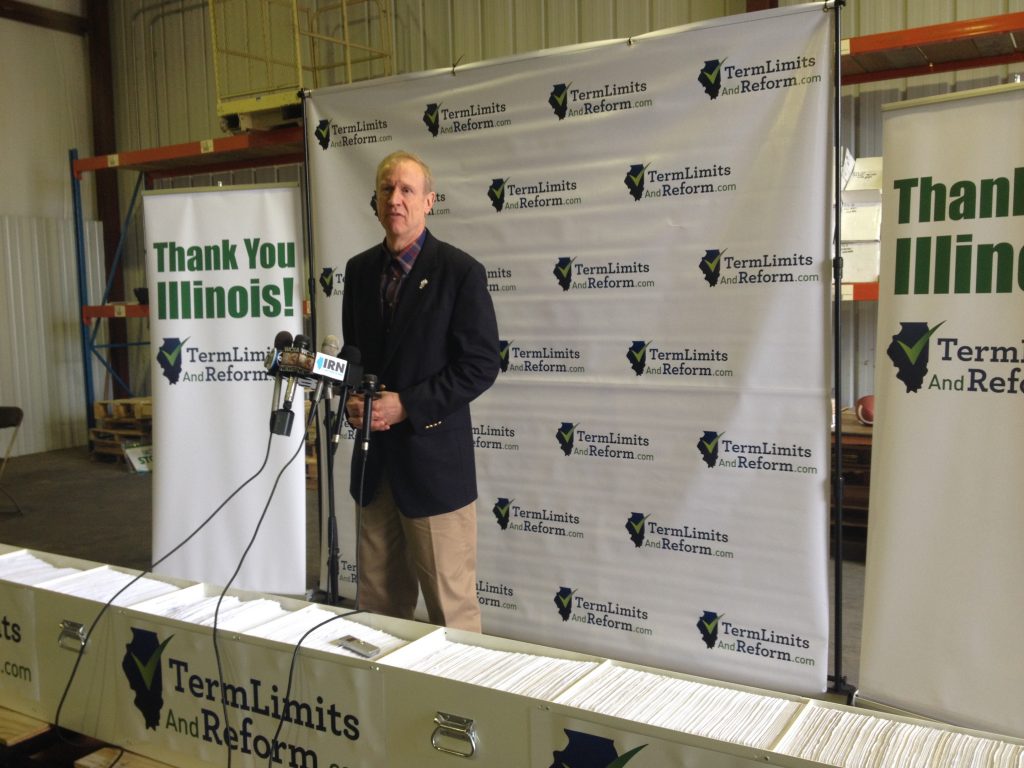 Then-candidate Bruce Rauner tells reporters he believes term limits will eliminate corruption in Illinois, as he delivers a 67,976-page petition containing 591,092 signatures for the ballot initiative in a Springfield warehouse on April 30, 2014. [Hannah Meisel/The Daily Line]
Then-candidate Bruce Rauner tells reporters he believes term limits will eliminate corruption in Illinois, as he delivers a 67,976-page petition containing 591,092 signatures for the ballot initiative in a Springfield warehouse on April 30, 2014. [Hannah Meisel/The Daily Line] -
The leading sector in job growth during the past year in Illinois has been government, according to new figures out Thursday from the Illinois Department of Employment Security.
 The Illinois State Capitol. [Hannah Meisel/The Daily Line]
The Illinois State Capitol. [Hannah Meisel/The Daily Line] -
The Illinois Republican Party Thursday reported receiving a $100,000 contribution from Citizens for Rauner Inc. dated Nov. 8, two days after Gov. Bruce Rauner lost his re-election bid and the ILGOP lost several seats in both the Illinois House and Senate.
-
The Illinois House Senate blew through dozens of bills Wednesday, overriding outgoing Gov. Bruce Rauner’s vetoes on nearly all of the legislation. Three key bills made it out of the Senate, including a measure to ban selling tobacco products to those under 21, one regulating the peer-to-peer car sharing industry and a third that raises the maximum amount the state can pay out to families of those who died at the Quincy Veterans’ Home from $100,000 to $2 million.
-
With a little help from Republicans, Democrats in the Illinois Senate overrode Gov. Bruce Rauner’s veto on a bill that would speed up the process for undocumented immigrants who’ve been victims of violent crimes to begin filing for visas.
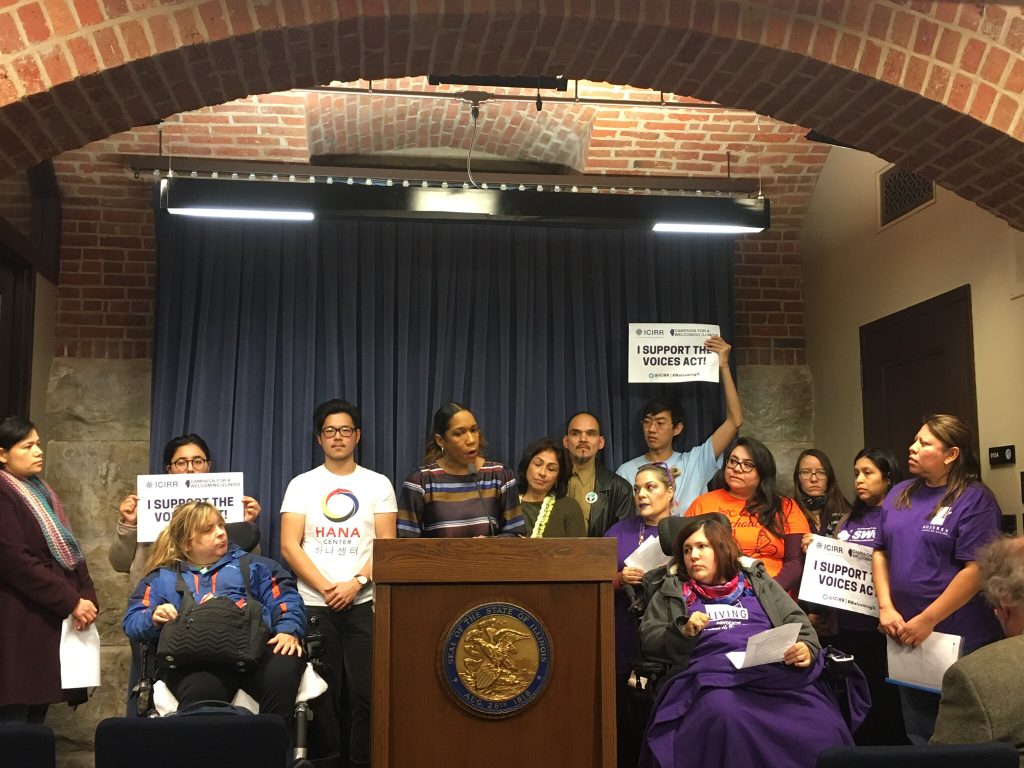 Lt. Gov.-elect Juliana Stratton speaks in favor of the Voices Act at a Wednesday press conference. [Hannah Meisel/The Daily Line]
Lt. Gov.-elect Juliana Stratton speaks in favor of the Voices Act at a Wednesday press conference. [Hannah Meisel/The Daily Line] -
Sponsors and proponents of a bill to regulate peer-to-peer car sharing companies like San Francisco-based Turo said Tuesday they have the votes to override Gov. Bruce Rauner’s amendatory veto of the legislation, which would require Turo and competitors to pay state and local taxes on rental transactions and would mandate more safety regulations.
-
In the wake of a “Blue Wave” election last week, State Rep. Will Guzzardi (D-Chicago), is in the final stages of planning for the General Assembly’s first Progressive Caucus, set for a rollout in January with the inauguration of Gov.-elect JB Pritzker and the swearing-in of a new class of Democratic lawmakers.
-
On the 4700 block of north Kenmore Avenue, in the heart of Chicago’s Uptown neighborhood sat a collection of cars all owned by “Michael O.” — the city’s most successful auto lender on car-sharing platform Turo.
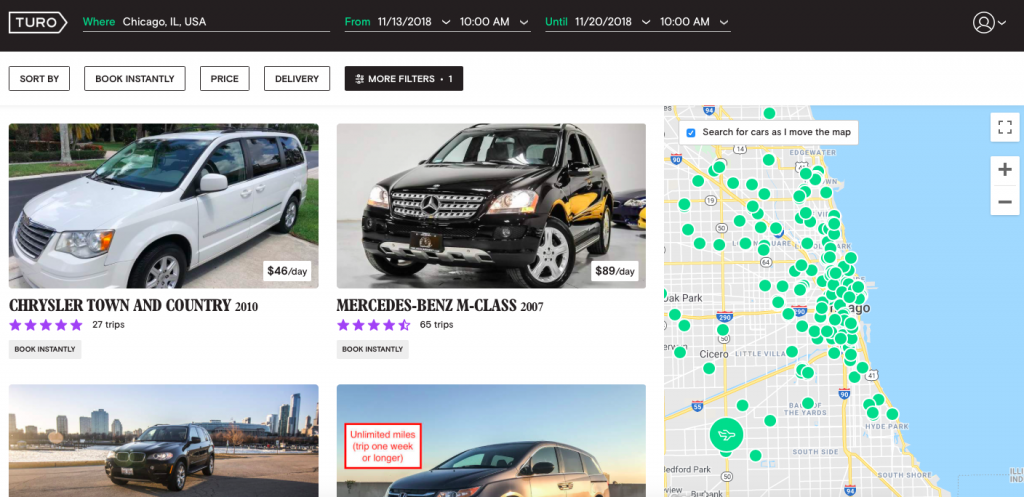 The Turo platform.
The Turo platform.
Michael O., who is actually Michael Anthony Oates, according to city paperwork, owns as many as 40 vehicles that he leases out for short-term stints using Turo, a Silicon Valley-based startup that promotes itself as the future of the car rental industry, just as Airbnb has disrupted the hotel and motel industry.
Though many of Oates’ cars appear to be mid-range sedans, Turo has gained popularity in part by offering flashy cars for rent for as little as $100 a day. Luxury car brands available via Turo in Chicago include Mercedes Benz, BMW, Maserati, Porsche, Land Rover, Tesla and Jaguar.
But Oates’ fleet of mid-line vehicles he rents out on Turo caused major parking headaches in Uptown, where he once parked a portion of his 40 vehicles on a street just two blocks away from the Aragon Ballroom and the Riviera Theatre, and where many residents frequently struggle.
Ald. James Cappleman (46), who also lives on Kenmore, found out about Oates’ cars a little more than a year ago, when residents began to complain that lock boxes containing keys to the cars began showing up on fences outside of apartment buildings on the street.
Oates could not be reached for comment.Eventually, the city’s Department of Business Affairs and Consumer Protection sent a cease and desist letter to Oates last December at Cappleman’s request, but Cappleman said that in response, Oates just moved the lockboxes down the block. Now, the lock boxes are stored in the vehicles’ wheel wells.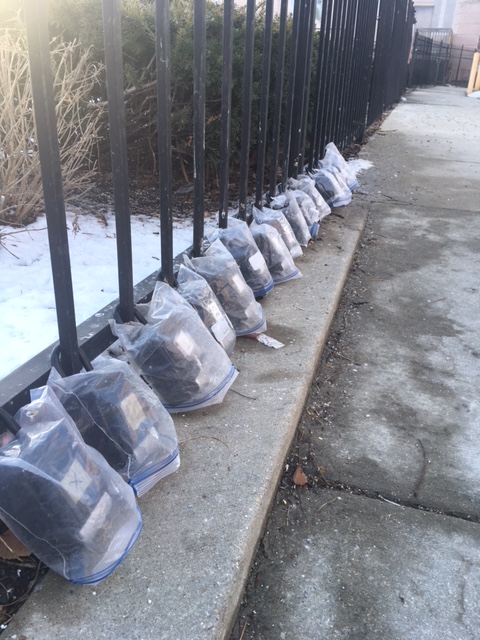 Turo lock boxes in Uptown. [46th Ward Office]
Turo lock boxes in Uptown. [46th Ward Office]
A representative of Turo said that was inaccurate.
"These parking issues were addressed months ago and there are no cars associated with Turo parked on that street," said Turo Government Relations Vice President Michelle Peacock. "However, several cars identified were parked with no parking zone sticker or the wrong sticker. The Alderman can simply solve this problem by enforcing existing parking regulations with a single call to have these cars ticketed and towed."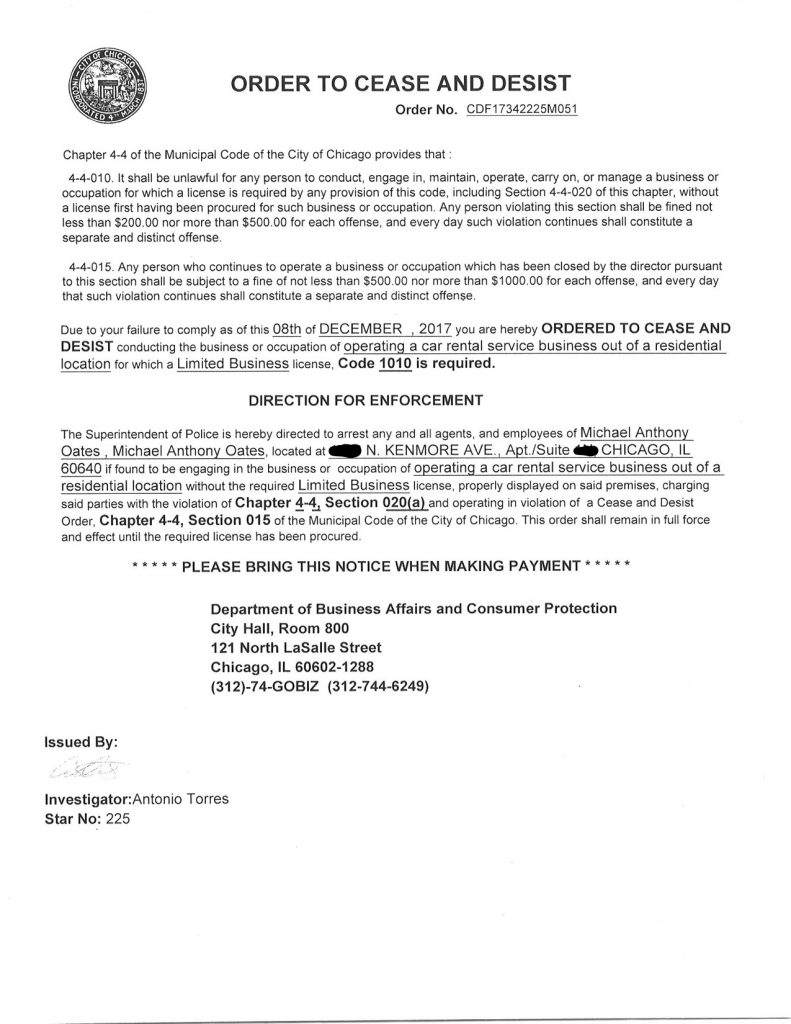
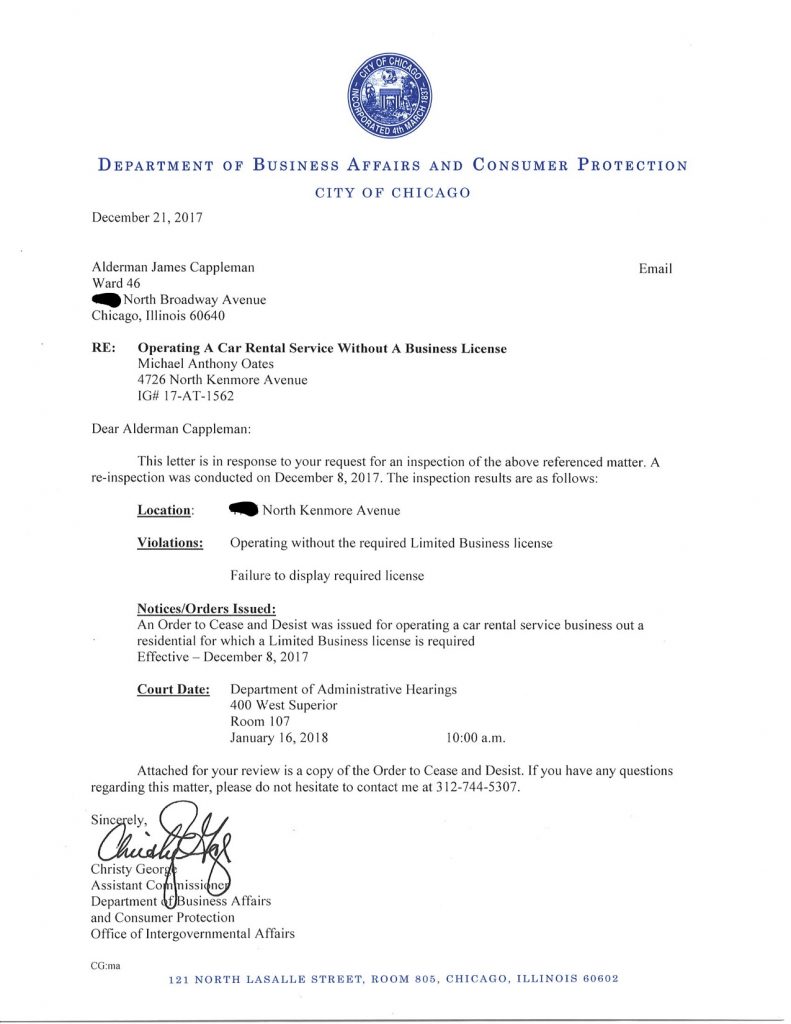
Cappleman told The Daily Line that his office has received complaint after complaint about Oates’ cars, and said parking has become the No. 1 issue in his ward.
“This person ranks far and above having more cars than anyone,” Cappleman said. “Every good thing that surfaces, someone comes up and takes it to the extreme. [Oates] took it to the extreme in the 46th ward and the residents are furious. So am I.”
Cappleman faces a tough fight to win re-election in February, with four challengers already announced, including Chicago teacher Erika Wozniak Francis, who has the backing of U.S. Rep.-elect Jesus “Chuy” Garcia, D-Chicago).
Cappleman said his attempts to resolve the issue by enforcing city law ground to halt, after Chicago’s Law Department told the aldermen that lawmakers in Springfield would first have to pass a bill regulating the car-sharing industry before they could take action against Oates.
Now Cappleman is counting on lawmakers to override an amendatory veto from Gov. Bruce Rauner on just such a bill, SB 2641, which was heavily negotiated and passed in the waning days of Spring legislative session in May.
Rauner’s late August veto of the bill came as a surprise to chief sponsor State Rep. Art Turner (D-Chicago), who told The Daily Line he wasn’t aware the governor’s office had any issues with the bill.
“I never had a formal conversation,” Turner said. “I read the governor’s veto message and figured out the strategy from there.”
Rauner’s official veto message objected to the “sweeping” nature of the legislation, and contained dozens of specific recommendations for change in order to let car-sharing businesses like Turo thrive in Illinois.
“Oversight of this new industry is important to protect consumers; however, we should be careful not to unintentionally smother its growth before it has a chance to get off the ground,” Rauner’s veto message said.
But Turner and his co-sponsors, including State Rep. Grant Wherli (R-Naperville), aren’t paying any mind to any of the governor’s suggestions, and on Tuesday will hold a news conference about the bill and vow put it on the House floor at some point this week.
“I think there’s support for the bill,” Turner said. “Every day without regulation in this industry could be safety concern for citizens of Illinois.”
Some of those safety concerns include peer-to-peer car sharing’s lack of oversight when it comes to the onus of replacing recalled vehicle parts. According to the National Transportation Safety Board, 25 percent of cars on the road have an unfixed recall notice.
“We have the opportunity in Illinois to set the standard for safety,” sponsor State Sen. Antonio Muñoz (D-Chicago) said in a statement late last month. “Millions of vehicles across the nation are currently operating with unsolved safety recalls. Renting these vehicles out to customers creates hazards for everyone on the road.”
Muñoz’s colleague and co-sponsor, State Sen. Sue Rezin (R-Morris) said in that same statement that she will not bend to Rauner’s amendatory veto.
"I voted in favor of this legislation last spring because I believe it will protect consumers and includes important safety measures,” Rezin said. "My position has not changed."
The legislation would also regulate insurance and liability concerns for peer-to-peer car sharing, much like traditional car rental companies are regulated. Giants in this area like Enterprise and Hertz have spent millions of dollars and many hours over the last few years lobbying states to regulate these sorts of startup companies that have turned into competition.
Turner also said he had heard about Oates’ 40-car fleet, and said his bill could help deal with “nuisance situations” like that of Oates’ Turo business.
“As it stands right now, there’s nothing the city or police or local law enforcement can do to even address the situation,” Turner said.
Cappleman said he hopes that if Turo begins to be regulated more like a traditional car rental company, including having to pay taxes on the transactions, one consequence of the new law would be Oates winnowing his fleet.
If the legislature overrides the bill, Cappleman also said that he would introduce an ordinance in City Council that would limit the number of street parking permits one person could buy.
Cappleman emphasized that he isn’t trying to shut down Turo or similar companies, saying it’s “a great idea, but it’s been horribly abused.”
In late October, lobbyists pushing for the override of Rauner’s amendatory veto on SB 2641 put out a statement describing the bill as “common sense legislation,” and pointed out that local governments could also stand to gain from regulation of car-sharing companies.
"Municipalities have watched their funds be depleted in recent years, which is why it is imperative that the state not prevent them from collecting this revenue, particularly since it falls in line with industries already being taxed," Illinois Municipal League Executive Director Brad Cole said.
**Editor's note: This story, originally published Nov. 13, has been updated on Nov. 16 to include a response from Turo.** -
A GOP lawmaker’s Freedom of Information Act request revealed that an actuary disciplined for making incorrect calculations for certain suburban municipalities’ pension fund contributions was involved with 29 pension funds in Illinois.
-
<span data-mce-type="bookmark" style="display: inline-block; width: 0px; overflow: hidden; line-height: 0;" class="mce_SELRES_start">
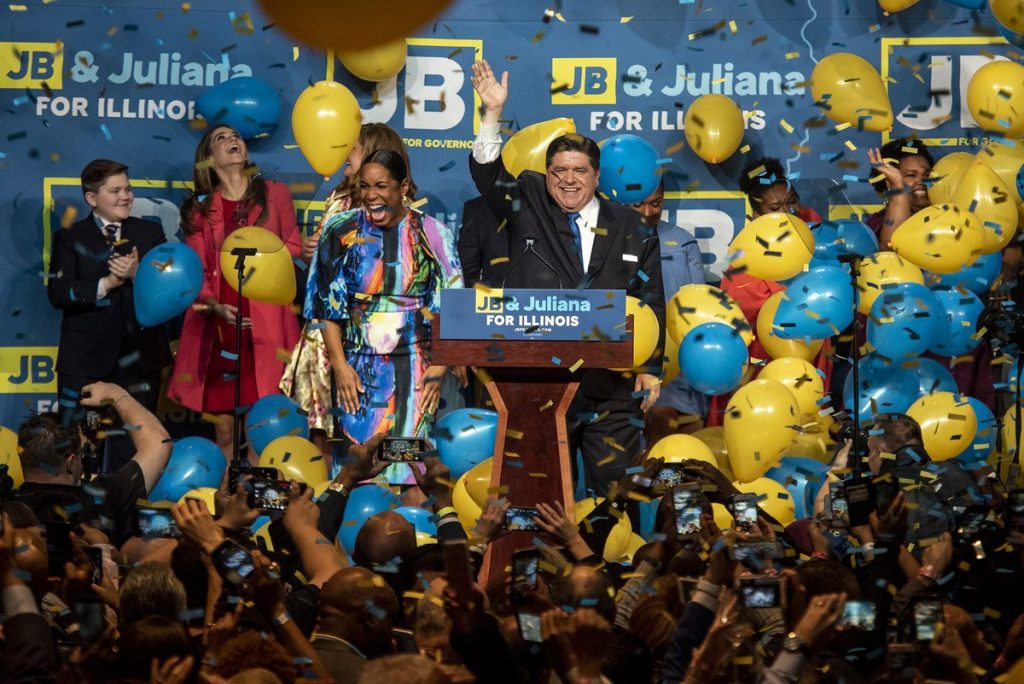 J.B. Pritzker declares victory. [Twitter/JBPritzker]
J.B. Pritzker declares victory. [Twitter/JBPritzker]
ProPublica Illinois reporter Mick Dumke looks at the state’s political issues and personalities in this occasional column.
The official slogan of the state of Illinois remains “Land of Lincoln,” and lots of Republicans still live here. But it’s no longer the land of his political party. The GOP isn’t winning many elections, which is generally considered the purpose of a political party.
And that brings us to the bluebath that happened this week, when Illinois Democrats seized two congressional seats that for decades had been held by Republicans, ousted one-term Gov. Bruce Rauner, easily held onto every other statewide office, solidified control of the General Assembly and toppled the Cook County commissioner who chairs the state GOP.
In short, it wasn’t a great night here for the Republicans.
“The land of Lincoln and Barack Obama,” J.B. Pritzker called the state during his speech after beating Rauner. He didn’t need to point out that Obama is a fellow Democrat.
Here are a few observations and thoughts on what happened and what might happen next:
Rauner didn’t lose all his friends — but he certainly didn’t make enough new ones.
Four years ago, voters were weary of state leaders’ lack of fiscal discipline — high taxes and billions of dollars of debt will do that — and Gov. Pat Quinn didn’t inspire confidence. Rauner, a millionaire businessman, promised to fix the government and stand up to Michael Madigan, the state House speaker, Democratic Party chair and most powerful figure in state government.
Rauner received about 1.8 million votes to 1.7 million for Quinn, who didn’t concede until the day after the election.
After four years of bitter feuding with Madigan, including a two-year budget impasse, Rauner still received more than 1.7 million votes Tuesday. Unfortunately for him, about 2.4 million people voted for Pritzker.
Emblematic was DuPage County, a GOP stronghold. In 2014, Rauner cleaned up there with 61 percent of the vote. This time, though he received close to the same number of actual votes, he lost the county to Pritzker.
Pritzker gave out more goodies than Rauner.
In 2014, Rauner didn’t just win his party’s nomination — he all but purchased it, just as he’d bought and sold businesses when he was leading a private equity firm. In the two years leading to his election as governor, Rauner poured about $28 million of his personal wealth into his campaign fund, records show. At the same time, Rauner, his campaign, and his wife, Diana, gave more than $9 million to other GOP candidates and committees across Illinois.
As he moved toward his re-election bid, Rauner was even more generous, putting $50 million into his campaign fund and distributing almost $16 million to other Republicans.
The strategy, and the money, were so convincing that Pritzker decided to do the same thing, but on a scale that made Rauner’s giving look chintzy by comparison. Pritzker pumped more than $171 million of his own money into his campaign fund, and he handed out about $24 million to other Democratic committees and candidates, including the DuPage County Democratic Central Committee.
Now Democrats won’t have Rauner to kick around any more.
As the state budget crisis stretched more than two years, Democrats blamed Rauner, and much of the public sided with them. Rauner conceded defeat Tuesday less than an hour after the polls closed, ending the contentious, expensive campaign so suddenly that some of the governor’s critics seemed unprepared to talk about what they’ll do once he’s out of the way.
Thirty minutes after the race was called, state Comptroller Susana Mendoza took the stage at Pritzker’s election night gathering and introduced herself as “your truth-telling fiscal watchdog who was not afraid to stand up to the biggest bully in this state, Bruce Rauner!” Mendoza, who is weighing a run for mayor of Chicago, then celebrated Rauner’s defeat by shouting, “You’re fired!” — a line long associated with Donald Trump’s days on the reality show “The Apprentice.”
The Democrats still weren’t done ripping on Rauner. An hour after he conceded, Sen. Richard Durbin ridiculed the governor for riding his motorcycle around the state while wearing a leather vest. Downstaters, he said, “can spot a phony a mile away.”
Then, on Wednesday, Madigan took a shot at Rauner in a press release, which was especially striking because he rarely issues statements or otherwise communicates with the public. “Last night’s election results definitively proved that the Rauner Republican playbook of attempting to make the entire 2018 election a referendum on Speaker Madigan, to distract from Republicans’ record, is a failure,” the release said.
Instead, the Democrats managed to turn the elections into a referendum on Rauner and Trump. Voters now hope the Democrats will be half as good at addressing the state’s budget and debt problems as they were at mocking the governor.
Now Republicans won’t have Rauner to kick around any more.
Democrats disliked Rauner from the beginning, but for many conservative Republicans it took a couple of years. After he signed legislation expanding access to abortion and protections for undocumented immigrants, the right wing of the party launched its own attacks. To critics like state Rep. Jeanne Ives, Rauner had abandoned the party’s base, proving once again that the Democrats will always win if Republicans “surrender” and move to the center.
Still, Ives came up short when she challenged Rauner in the GOP primary. So have most of the conservative candidates backed by her allies and funders. For example, of the top 20 candidates supported this election cycle by the Liberty Principles political action committee, run by Ives ally Dan Proft, 16 lost. Among them: state Rep. Peter Breen, the GOP floor leader in the state House, who represents a district in DuPage County.
The election is over. The next elections have begun.
Now in power, Democrats will work to move the state to the left.
“Are you ready to fight for Illinois?” Pritzker said during his victory speech, and his supporters shouted that they were.
But as the GOP regroups, Ives and her allies are funded by their own really rich guys, and they’re eager to keep pushing the party and the land of Lincoln to the right.
Meanwhile, in Chicago, Mayor Rahm Emanuel isn’t running for re-election in February, and 17 would-be successors, give or take a few, are hoping to get on the ballot. All 50 seats in the City Council are also up for election. Voters were tuned in even before the ballots were counted Tuesday.
“They’re glad about the mayor’s race,” said Barbara Kendricks, who was talking with voters and handing out flyers Tuesday outside a polling place in the South Side Kenwood neighborhood. “The mayor, we want him out.”
Do you like this page?










